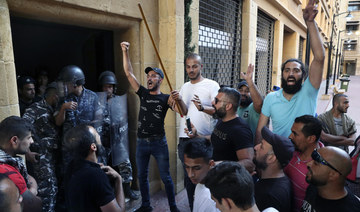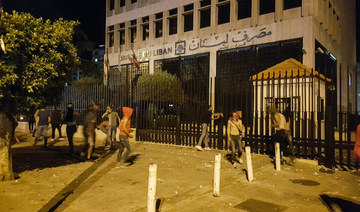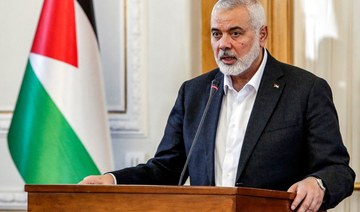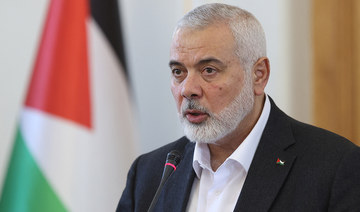BEIRUT: Lebanon’s cash-strapped leaders are bribing their base with free Covid-19 jabs ahead of next year’s elections, in what observers say is the latest variant on an old corruption trick.
The “vaccine for vote” system builds on decades-old patronage practices that have seen leaders buy their way into office by offering voters money or public sector employment.
But with state resources stretched to their limit by a severe economic crisis and international aid dwindling due to a failure to deliver promised reforms, politicians are turning to Covid jabs to stock up on political capital.
“Political forces are trying to directly or indirectly make themselves a part of the equation with regards to the vaccine campaign, primarily because it is a profitable investment,” said a member of the state-run National Vaccination Committee who spoke on condition of anonymity.
Prime minister-designate Saad Hariri, a leading figure in Lebanon’s Sunni community, organized a countrywide vaccination campaign with the help of his Future Movement in early May.
More than 7,000 people received at least one dose of the Russian Sputnik V vaccine, said spokesperson Abdel Salam Moussa. Tens of thousands of new jabs are expected to arrive in the coming weeks, he told AFP.
The Free Patriotic Movement (FPM), founded by President Michel Aoun, and its Christian rival the Lebanese Forces, have also distributed jabs through private initiatives organized by members or affiliates.
Elias Bou Saab, a lawmaker close to the FPM, rented out a private hospital outside Beirut until March next year for vaccination purposes.
Last month, he said he would provide “20,000 doses of the Pfizer vaccine to be distributed free of charge.”
Antoine Habchi of the Lebanese Forces provided jabs for 1,600 people in the eastern region of Baalbek. “The funds were raised from the diaspora,” he told AFP.
The Lebanese government, with the help of international agencies, provides free jabs of the Pfizer or AstraZeneca vaccine on a priority basis.
It started its vaccination campaign in February, but the rollout was initially slow, forcing many, including political leaders, to turn to private suppliers providing Sputnik doses.
With more than half the population living below the poverty line and the Lebanese pound sliding rapidly against the dollar on the black market, vaccines are a luxury for many.
Two Sputnik doses are sold to companies and associations for $38, which amounts to 500,000 Lebanese pounds at the black market rate, or around three quarters of the minimum wage.
Firas, a former insurance broker, had registered along with his wife for state-sponsored vaccination.
But when a political party offered him free jabs, he chose not to wait for the government.
“I have been unemployed for six months. How would I have afforded vaccines for two people?” said the 52-year-old, who declined to name the party that sponsored his Sputnik dose.
Out of nearly 900,000 people who have received vaccines in Lebanon, nearly 60,000 benefited from party handouts, said Mohamad Haidar, a health ministry adviser.
The powerful Hezbollah movement, an Iran-backed party that boasts major welfare institutions, including several hospitals, says it is not distributing vaccines.
With health minister Hamad Hassan hailing from its ranks, Hezbollah can rely solely on the state, said political scientist Hilal Khashan of the American University of Beirut.
According to a 2019 report by Transparency International, nearly one in two people in Lebanon is offered a bribe in return for their vote, while more than one in four receives threats if they do not comply.
With traditional party leaders going up against a revitalized opposition in elections next year, vaccine handouts could be “exploited for political ends,” said Julien Courson, the director of the Lebanese Transparency Association.
But vaccines aren’t the only honey pot.
Food prices in Lebanon have soared by up to 400 percent as of December and medicines are fast disappearing from pharmacy shelves.
Political patrons are stepping in to ease the blow.
The FPM will launch a platform for medicine exchange that will primarily benefit party supporters, said Marwan Zoghbi of the party’s coronavirus committee.
People with a surplus of a certain medicine will be matched with those who are in need, he said.
Hezbollah, which has long offered a wide array of social services, said in April that it is boosting the number of supporters who benefit from assistance.
Services include a shopping card for discounted food items sold at select discount stores.
But with Lebanon’s woes piling up quickly, political parties across the board will struggle to keep up.
“Lebanese clientelism is failing because the political system does not have material resources to dispense to sectarian leaders,” said Khashan.
“The pervasive poverty attests to the failure of the system and the inability of confessional leaders to provide for their impoverished followers.”
Jabs for votes: Lebanon’s oligarchs turn to Covid bribery
https://arab.news/6zqh2
Jabs for votes: Lebanon’s oligarchs turn to Covid bribery
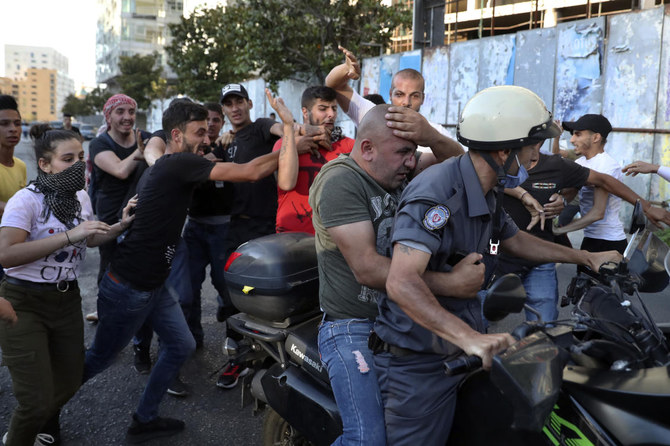
- Saad Hariri organised a countrywide vaccination campaign with the help of his Future Movement in May
- Lawmaker Elias Bou Saab, close to FPM, rented a private hospital for vaccination purposes & Lebanese Forces’ Antoine Habchi provided 1,600 jabs in Baalbek
Hamas chief Haniyeh arrives in Turkiye for talks
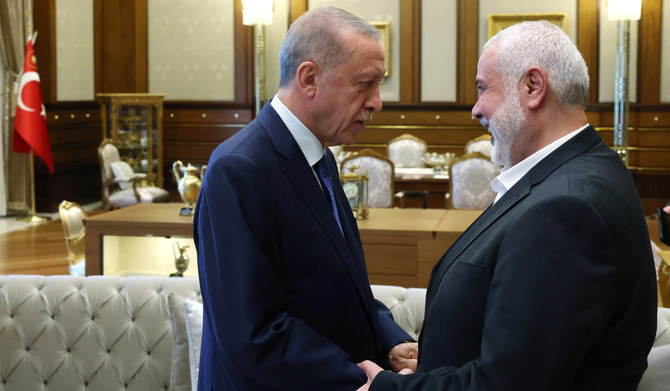
- Fidan said he spoke with Haniyeh, who lives in Qatar, about how Hamas — designated as a terrorist organization by Israel, the United States and the European Union — “must clearly express its expectations, especially about a two-state solution”
ISTANBUL: A leader of Palestinian militant group Hamas, Ismail Haniyeh, arrived in Istanbul Friday evening for talks with Turkish President Recep Tayyip Erdogan as the death toll in Gaza passed 34,000.
A statement from Hamas Friday said Erdogan and Haniyeh would discuss the conflict in Gaza, adding that the head of the group’s political bureau was accompanied by a delegation.
Middle East tensions are at a high after Israel’s reported attack on Iran and Gaza bracing for a new Israeli offensive.
Erdogan insisted on Wednesday that he would continue “to defend the Palestinian struggle and to be the voice of the oppressed Palestinian people.”
But talking to journalists on Friday, he refused to be drawn on the details on the meeting.
Turkish Foreign Minister Hakan Fidan was in Qatar Wednesday and said he spent three hours with Haniyeh and his aides for “a wide exchange of views in particular about negotiations for a ceasefire.”
Qatar, a mediator between Israel and Hamas, acknowledged Wednesday that negotiations to end hostilities in Gaza and liberate hostages were “stalling.”
Fidan said he spoke with Haniyeh, who lives in Qatar, about how Hamas — designated as a terrorist organization by Israel, the United States and the European Union — “must clearly express its expectations, especially about a two-state solution.”
Erdogan’s last meeting with Haniyeh was in July 2023 when Erdogan hosted him and Palestinian president Mahmud Abbas at the presidential palace in Ankara. Haniyeh had last met Fidan in Turkiye on January 2.
The war in Gaza started after Hamas’s unprecedented attack on Israel on October 7 that resulted in the deaths of about 1,170 people, mainly civilians, according to an AFP tally of official Israeli figures.
Militants also took about 250 hostages. Israel says around 129 are believed to be held in Gaza, including 34 presumed dead.
Israel’s retaliatory military campaign has killed at least 34,012 people, mostly women and children, according to Gaza’s Hamas-run health ministry.
Huge blast at military base used by Iraqi Popular Mobilization Forces, sources say

- PMF sources said the strikes targeted a headquarters of the PMF at the Kalso military base near the town of Iskandariya around 50 km south of Baghdad
BAGHDAD: A huge blast rocked a military base used by Iraq’s Popular Mobilization Forces (PMF) to the south of Baghdad late on Friday, two PMF and two security sources told Reuters.
The two security sources said the blast was a result of an unknown airstrike, which happened around midnight Friday.
The two PMF sources pointed out the strikes did not lead to casualties but caused material damage.
PMF sources said the strikes targeted a headquarters of the PMF at the Kalso military base near the town of Iskandariya around 50 km south of Baghdad.
Government officials did not immediately respond to a Reuters request for comment.
The PMF started out as a grouping of armed factions, many close to Iran, that was later recognized as a formal security force by Iraqi authorities.
Factions within the PMF took part in months of rocket and drone attacks on US forces in Iraq amid Israel’s Gaza campaign but ceased to do so in February.
Leaders of Jordan and Pakistan call UAE president to express concern about effects of severe storm

- Leaders passed on their best wishes to the country as it recovers from the storms
DUBAI: The president of the UAE, Sheikh Mohammed bin Zayed Al-Nahyan, received telephone calls from King Abdullah of Jordan and Pakistan’s Prime Minister Shehbaz Sharif on Friday, during which they expressed concern about the effects of the severe weather, including unusually heavy rainfall, that battered parts of the country this week.
They also passed on their best wishes to the country as it recovers from the storms and “conveyed their heartfelt hopes for the safety and prosperity of the UAE and its people, praying for their protection from any harm,” the Emirates News Agency reported.
Sheikh Mohammed thanked both leaders for their warm sentiments, and emphasized the strong bonds between the UAE and their nations.
The UAE and neighboring Oman were hit by unprecedented rainfall and flooding on Tuesday, with more than 250 millimeters of rain falling in parts of the Emirates, considerably more than is normally seen in a year. Dubai International Airport was forced to close temporarily when runways were flooded.
Peshmerga fighter dies in Turkish strike in north Iraq

JEDDAH: A member of the Kurdish Peshmerga security forces was killed on Friday in a Turkish drone strike in the autonomous Kurdistan region of northern Iraq.
Ankara regularly carries out ground and air operations in the region against positions of the outlawed PKK, the Kurdish separatist group that has waged a decades-long insurgency against the Turkish state.
The victim of Friday’s attack died in a drone strike on his vehicle, said Ihsan Chalabi, mayor of the mountainous Sidakan district near Iraq’s borders with Turkiye and Iran.
For decades, Turkiye has operated several dozen military bases in northern Iraq in its war against the PKK, which Ankara and its Western allies consider a terrorist group.
Both Baghdad and the Kurdish regional government have been accused of tolerating Turkiye’s military activities to preserve their close economic ties.
At the beginning of April, a man described as “high-ranking military official” from the PKK was killed in a Turkish drone strike on a car in the mountainous Sinjar region, according to the Kurdistan counterterrorism services.
Turkish President Recep Tayyip Erdogan is expected to visit Baghdad on Monday on his first official visit to Iraq since 2011.
Iraq’s Defense Minister Thabet Al-Abassi in March ruled out joint military operations against the PKK, but said that Turkiye and Iraq would “work to set up a joint intelligence coordination center.”
Middle East in ‘shadow of uncertainty due to regional conflicts’

WASHINGTON: Economies in the Middle East and North Africa face a “shadow of uncertainty” from ongoing tensions in the region, a senior IMF official said.
“We are in a context where the overall outlook is cast into shadows,” Jihad Azour, the International Monetary Fund’s director for the Middle East and Central Asia department, said in an interview in Washington.
“The shadow of uncertainty on the geopolitical side is an important one,” added Azour, a recent candidate for the next Lebanese president.
In the face of the ongoing conflicts in Gaza and Sudan and a recent cut to oil supplies by Gulf countries, the IMF has pared back its growth outlook for the Middle East and North Africa region once again.
FASTFACT
Economic activity in Gaza has ‘come to a standstill’ and the IMF estimates that economic output in the West Bank and Gaza contracted by six percent last year.
The IMF expects growth in MENA of 2.7 percent this year — 0.2 percentage points below its January forecast — before picking up again next year, the IMF said in its regional economic outlook report.
The risks to growth in the MENA region remain heightened, the IMF said, pointing to the danger of greater regional spillovers from the ongoing Israel-Gaza war.
“We have concerns about the immediate and lasting impact of conflict,” Azour said.
The IMF report said that economic activity in Gaza has “come to a standstill” and estimates that economic output in the West Bank and Gaza contracted by 6 percent last year.
The IMF said the report excludes economic projections for the West Bank and Gaza for the next five years “on account of the unusually high degree of uncertainty.”
The IMF cannot lend to the West Bank and Gaza because they are not IMF member countries.
However, Azour said it has provided the Palestinian Authority and the central bank with technical assistance during the current conflict.
“When we move into the reconstruction phase, we will be part of the international community support to the region,” he added.
Azour also discussed the situation in Sudan, where thousands have been killed in a civil war that has also devastated the economy, causing it to contract by almost 20 percent last year, according to the IMF.
“The country is barely functioning, institutions have been dismantled,” he said.
“And for an economy, for a country like Sudan, with all this potential, it’s important to stop the bleeding very quickly and move to a phase of reconstruction,” he added.
The recent Houthi attacks have particularly badly hit the Egyptian economy on Red Sea shipping, which caused trade through the Egypt-run Suez Canal to more than halve — depriving the country of a key source of foreign exchange.
Egypt reached an agreement last month to increase an existing IMF loan package from $3 billion to $8 billion after its central bank hiked interest rates and allowed the pound to plunge by nearly 40 percent.
A key pillar of the current IMF program is the privatization of Egypt’s state-owned enterprises, many of which are owned by or linked to the military.
“This is a priority for Egypt,” Azour said. Egypt needs to have a growing private sector and give space for the private sector to create more jobs.”
“We have an opportunity to re-engineer the state’s role, to give the state more responsibility as an enabler and less as a competitor,” he said.



